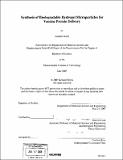Synthesis of biodegradable hydrogel microparticles for vaccine protein delivery
Author(s)
Werts, Kendall (Kendall Marie)
DownloadFull printable version (2.931Mb)
Other Contributors
Massachusetts Institute of Technology. Dept. of Materials Science and Engineering.
Advisor
Darrell Irvine.
Terms of use
Metadata
Show full item recordAbstract
Soluble protein antigens used in vaccines have shown lower immune responses when compared with certain particulate forms of these same antigens. For example, it has been shown that micro- and nano-particle mediated delivery of protein antigen can use up to 100 times less protein and still produce an effective immune response [1]. In order to use this phenomenon to make vaccines more efficient, we need a biodegradable delivery particle. This thesis modifies a particle created by Jain et al., which consists of a polymer network surrounding and trapping a protein, by removing the non-degradable crosslinker used in the original particle design and replacing it with a poly (ethylene glycol) acrylate molecule attached to ovalbumin protein. When a dendritic cell degrades the particle, the ovalbumin protein will be degraded, as will the connections between the polymer network that holds the particle together [2]. The particles degraded to 56% of their original size in 3 days, while the non-degradable particle degraded to only 80% of its original size.
Description
Thesis (S.B.)--Massachusetts Institute of Technology, Dept. of Materials Science and Engineering, 2007. Includes bibliographical references (p. 21).
Date issued
2007Department
Massachusetts Institute of Technology. Department of Materials Science and EngineeringPublisher
Massachusetts Institute of Technology
Keywords
Materials Science and Engineering.